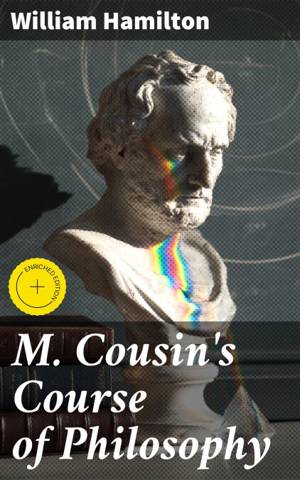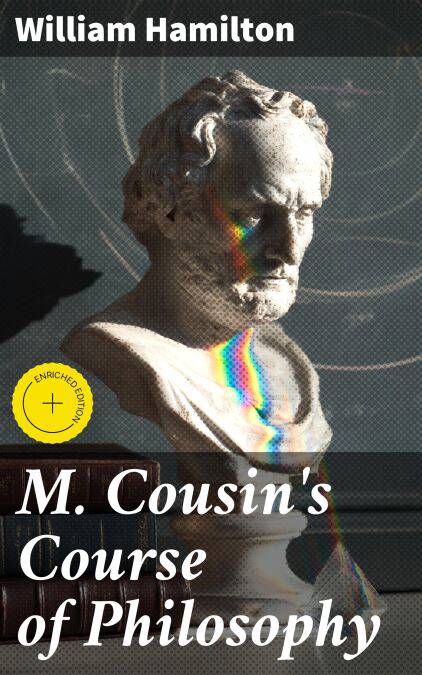
- Afhalen na 1 uur in een winkel met voorraad
- Gratis thuislevering in België vanaf € 30
- Ruim aanbod met 7 miljoen producten
- Afhalen na 1 uur in een winkel met voorraad
- Gratis thuislevering in België vanaf € 30
- Ruim aanbod met 7 miljoen producten
Zoeken
M. Cousin's Course of Philosophy E-BOOK
Enriched edition. Exploring Cousin's Philosophical Legacy through Hamilton's Critical Lens
William Hamilton
E-book | Engels
€ 1,99
+ 1 punten
Omschrijving
William Hamilton's "M. Cousin's Course of Philosophy" serves as a comprehensive exploration of French spiritualism and its impact on 19th-century philosophical discourse. Through a meticulous translation and analysis of Victor Cousin's lectures, Hamilton articulates the intricacies of Cousin's thought, merging clear, accessible prose with deeper philosophical inquiries. This work not only engages with metaphysical concepts but also situates them within the broader context of European intellectual history, illustrating how Cousin's synthesis of rationalism and idealism paved the way for later philosophical movements, particularly in Britain. Hamilton, a prominent Scottish philosopher and professor, was significantly influenced by the intellectual currents of his time, including German idealism and Scottish common sense philosophy. His academic background and personal curiosity about the interplay between mind and reality compelled him to undertake this translation. By making Cousin's work accessible to an English-speaking audience, Hamilton not only enhances the dialogue between French and British philosophy but also emphasizes the necessity of understanding diverse perspectives in the philosophical tradition. This erudite yet approachable text is highly recommended for students and scholars of philosophy alike. It offers critical insights into Cousin's ideas while exemplifying Hamilton's own philosophical inquiries, making it a vital addition to any philosophical reading list or library.
In this enriched edition, we have carefully created added value for your reading experience:
- A succinct Introduction situates the work's timeless appeal and themes.
- The Synopsis outlines the central plot, highlighting key developments without spoiling critical twists.
- A detailed Historical Context immerses you in the era's events and influences that shaped the writing.
- A thorough Analysis dissects symbols, motifs, and character arcs to unearth underlying meanings.
- Reflection questions prompt you to engage personally with the work's messages, connecting them to modern life.
- Hand‐picked Memorable Quotes shine a spotlight on moments of literary brilliance.
- Interactive footnotes clarify unusual references, historical allusions, and archaic phrases for an effortless, more informed read.
In this enriched edition, we have carefully created added value for your reading experience:
- A succinct Introduction situates the work's timeless appeal and themes.
- The Synopsis outlines the central plot, highlighting key developments without spoiling critical twists.
- A detailed Historical Context immerses you in the era's events and influences that shaped the writing.
- A thorough Analysis dissects symbols, motifs, and character arcs to unearth underlying meanings.
- Reflection questions prompt you to engage personally with the work's messages, connecting them to modern life.
- Hand‐picked Memorable Quotes shine a spotlight on moments of literary brilliance.
- Interactive footnotes clarify unusual references, historical allusions, and archaic phrases for an effortless, more informed read.
Specificaties
Betrokkenen
- Auteur(s):
- Uitgeverij:
Inhoud
- Aantal bladzijden:
- 34
- Taal:
- Engels
Eigenschappen
- Productcode (EAN):
- 4064066414788
- Verschijningsdatum:
- 7/12/2020
- Uitvoering:
- E-book
- Beveiligd met:
- Digital watermarking
- Formaat:
- ePub

Alleen bij Standaard Boekhandel
+ 1 punten op je klantenkaart van Standaard Boekhandel
Beoordelingen
We publiceren alleen reviews die voldoen aan de voorwaarden voor reviews. Bekijk onze voorwaarden voor reviews.








